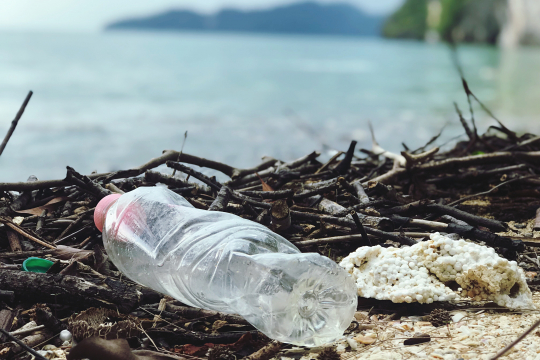Plastic pollution of marine ecosystems is a global problem with severe consequences for wildlife and economic activity. The Sustainable Seas Trust (SST) hosted the second International Conference of the African Marine Waste Network (AMWN). EfD researcher Reza Daniels contributed to a panel discussion about the economics of plastic pollution reduction.
Pollution of marine ecosystems is a global problem, with plastic pollution being one of the biggest issues within these systems. Plastic pollution has negative impacts on marine ecosystems with devastating consequences for marine wildlife, fishing industries, and human health. Plastic pollution is commonly a result of poor waste management on land and countries’ inability to manage the growing flow of waste.
In May 2022 the Sustainable Seas Trust (SST) hosted the second International Conference of the African Marine Waste Network (AMWN), titled “Towards Zero Plastics to the Seas of Africa”, where multiple stakeholders gathered to focus on the actions and interventions needed to move Africa towards no plastics entering the environment and seas. EfD South Africa researcher, Associate Professor Reza Daniels, was among the delegates presenting as part of a panel discussion that discussed the economic tools to reduce marine plastic waste.
“The levels of microplastics in the ocean are at unsustainable levels, threatening marine ecosystems and human health. In order to keep our oceans healthy it is important to ensure we reduce terrestrial sources of waste ending up in ocean,” explains Reza Daniels, EfD South Africa researcher. “It is important to bring together multiple stakeholders to help develop strategies to minimize marine and terrestrial waste while still enabling economic development, especially in less developed countries,” continues Daniels.
Image: Left - EfD researcher Reza Daniels. Right - #TurnOffThePlasticTap installation from the International Conference of the African Marine Waste Network.
Reducing marine plastic pollution
A major source of marine plastic pollution comes from poorly managed waste on land (e.g. towns and cities with poor waste management infrastructure). Reza Daniels was invited to speak about his experience investigating the role of behavioral economics and minimizing waste in poorer urban areas. Reza Daniels’ presentation was based on a framework developed in 2020 by himself and colleagues in the EfD network, titled: A framework for selecting and designing policies to reduce marine plastic pollution in developing countries.
A key insight from the study highlights the importance of land waste management and the role of socioeconomic context. Effective economic policy tools used to help tackle poor waste management can therefore range from traditional market-based tools to behavioral tools and can be adapted to be country-specific.
Complex problems require complex solutions
A major outcome from the conference is the concept that plastic pollution is a complex problem and therefore requires a mix of policy instruments. The framework presented by Reza Daniels suggests that flexible policy tools and strategies that are scalable within countries are vital to tackle pollution in any environment but especially in our oceans.
Africa’s role in a global problem
Africa faces a unique problem in that many areas which produce waste and pollution are underdeveloped regions. While these regions may generate much of the marine plastic pollution entering the ocean there is huge potential for these countries to develop strategies minimizing this pollution. The conference was designed to provide African countries with the knowledge and tools to develop effective and sustainable marine waste strategies which benefit economic, socio, and ecological growth.
“It is exciting to see that African countries are committed to developing marine waste mitigation plans,” explains Reza Daniels.
“This conference has helped position African countries front and center in terms of marine waste reduction strategies.”
By: Dr Michelle Blanckenberg
Read the framework used as a basis for Reza Daniel’s presentation

